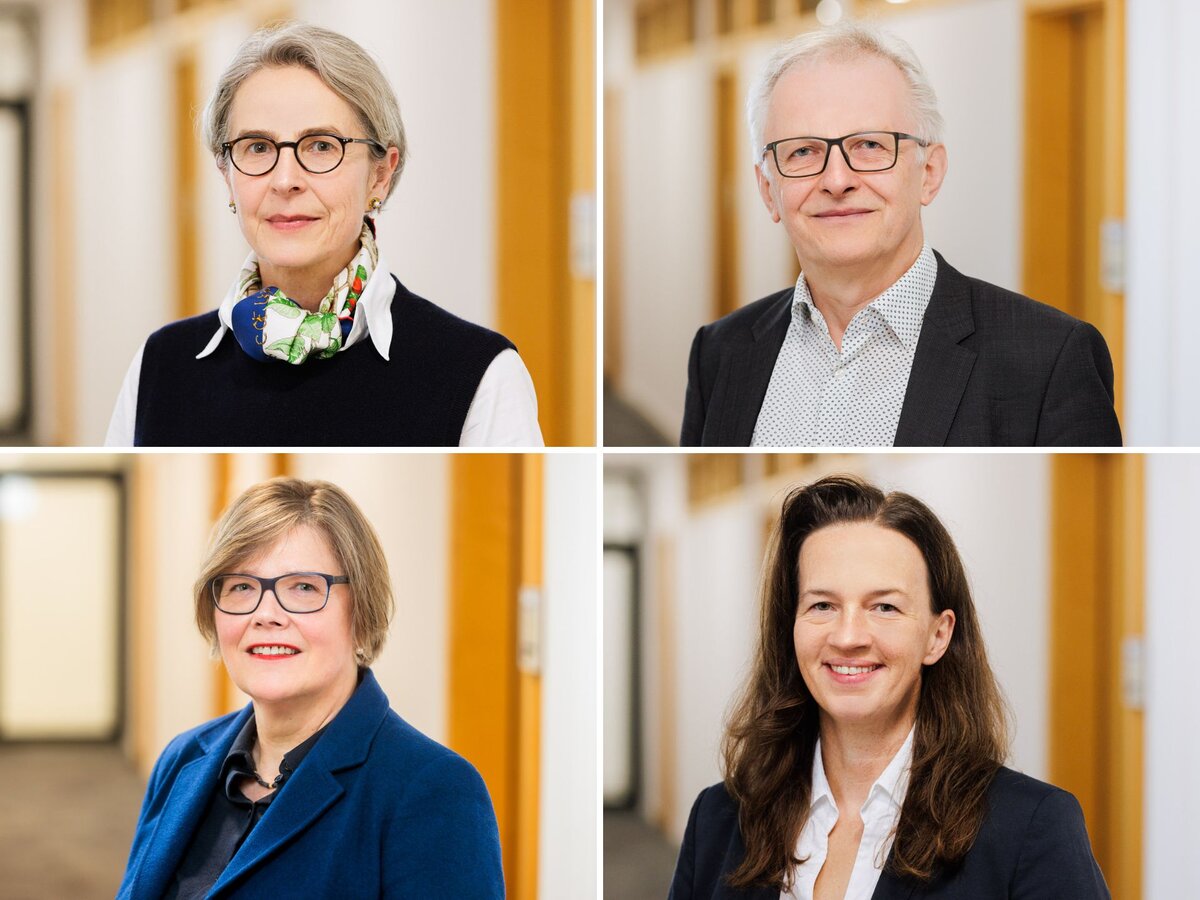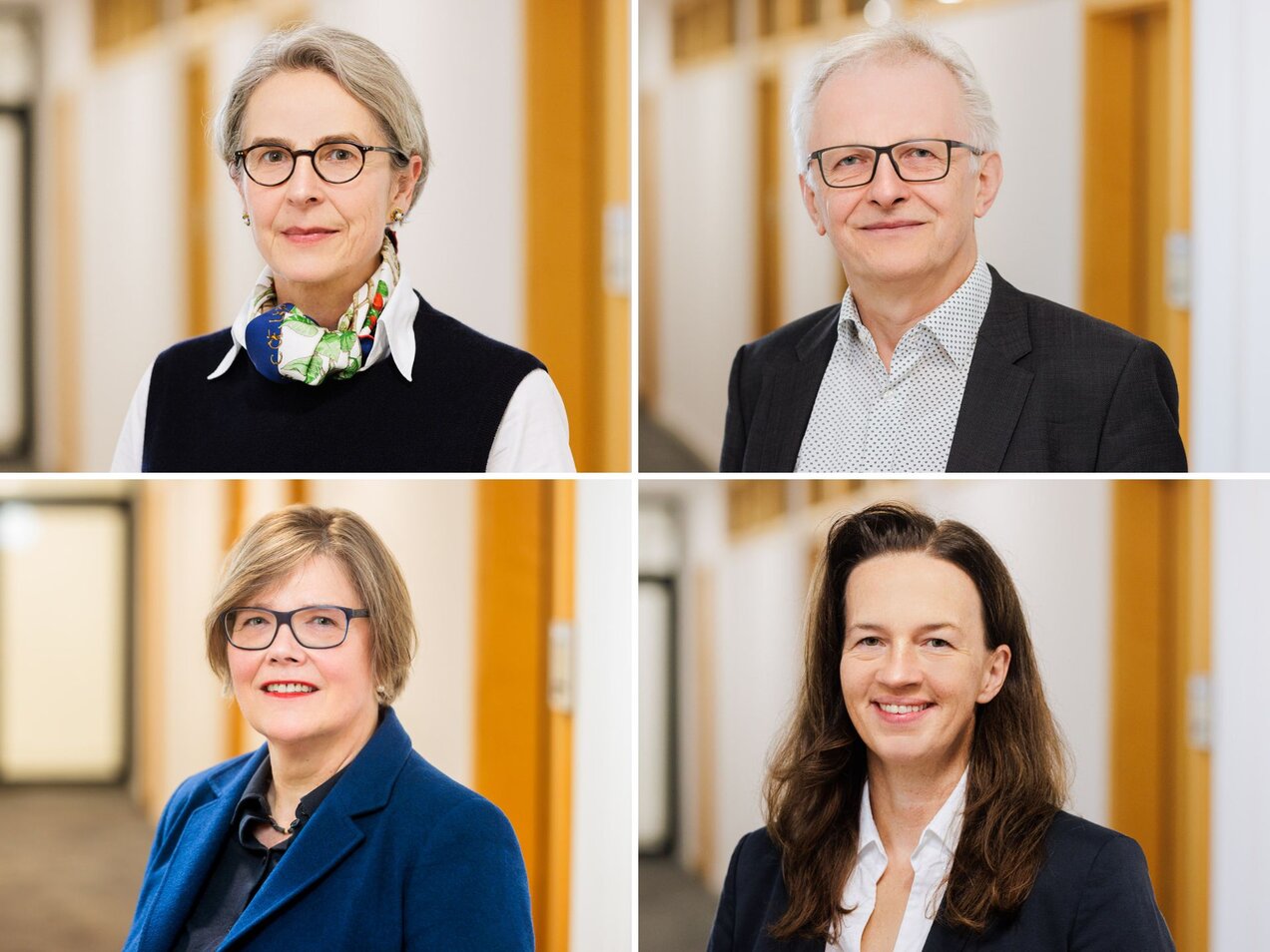
24/05/2024

The Scientific Board defines the guidelines for the College’s academic activities and selects international Senior Fellows. Its voting members are the Director and three professorial spokespersons from the member universities of the University Alliance Ruhr. In this interview, they explain how the open-topic approach is intertwined with the purpose of the College and outline the benefits for scholars of the UA Ruhr. They elucidate the role of the Senior Fellowship Programme in tapping the potential of collaborative research, and disclose what visiting scholars should ideally "take home" from their research stays at the College.
Julika Griem: Generally speaking, a college is a place where people study together and learn from each other. Our College does not involve students, but invites researchers from all over the world and the Ruhr universities. As we all come from very different backgrounds, with different languages, ideas and experiences, we hope to develop new perspectives on how societies hang together and individuals understand each other; on how cultures are constantly changing in multiple, both constructive and destructive ways. Under the roof of the College you will find experts on social behaviour and interaction, on values and norms, on communication, media and the arts, on stories and histories. We also offer events and publications reaching out beyond the university, as we are interested in a wider public’s questions and expectations about science and scholarship.
Ute Schneider: For me, setting up an Institute for Advanced Studies was a completely new, previously unknown challenge within the university system. It is an opportunity to develop new research structures and forms of communication between different disciplines and the three Ruhr universities and to put them into practice at the College. It is important to me that we involve colleagues from the three universities in this build-up process by taking transparent decisions. One of my central goals as a Scientific Board member is to increase visibility of the Ruhr region in the international science landscape.
Maximiliane Wilkesmann: The opportunity to pioneer collaboration between three universities, each yielding unique expertise and perspectives in the social sciences and humanities, was incredibly appealing to me. In this role, I hope to foster a supportive and inclusive environment where ideas can flourish and interdisciplinary connections can be established across institutional boundaries. During my term, I aim to champion initiatives that not only promote academic excellence, but also create new opportunities for cross-university collaboration, facilitate meaningful dialogue, and significantly advance our College’s collective knowledge and impact within the wider academic community.
Friedrich Balke: The Scientific Board has chosen this open-topic approach for two main reasons: on the one hand, to stimulate innovative discourses that make it possible to critically advance well-established research fields within the social sciences and humanities; on the other hand, to enable the emergence of new forms of knowledge that are not yet consolidated in fixed paradigms and take into account processes of epistemic hybridisation across disciplines. The focus of the College therefore is not on large-scale research clusters but rather on smaller groups and individuals. This approach privileges the dynamics of topic invention arising from unexpected collaborations (e.g., between Senior Fellows from diverse disciplinary contexts), methodological exchange, and mutual disciplinary reflection.
Ute Schneider: In the humanities and social sciences, research topics and methods are constantly changing because what is happening in the present generates our academic questions. We were and are curious about the research questions that are brought to us and want to give them space and a place within different research formats. At the same time, innovative research at the three universities should be stimulated and inspired by attracting academics at different career stages. The structures of the College then offer all colleagues in the University Alliance Ruhr the opportunity to develop new topics and questions and work on them in an interdisciplinary and international exchange.
Maximiliane Wilkesmann: Our College is a dynamic hub for interdisciplinary collaboration, fostering innovation and the exchange of ideas across disciplinary boundaries, maximising research potential and impact within and beyond the Research Alliance Ruhr. The Senior Fellowship Programme, for example, enhances the College's appeal by fostering international collaborations between tandem partners from the three universities, cultivating a vibrant research community and stimulating innovative initiatives. In our College, we also support early-career researchers in pursuing ambitious agendas and ensure a seamless transfer of knowledge across generations. Overall, the College promotes research excellence and collaboration within the University Alliance Ruhr, to the benefit of both the institution and its members.
Friedrich Balke: The humanities and social sciences depend on a space of collaboration in which questions and conceptual designs from new fields of research and forms of knowledge can emerge. The College brings together different disciplines with their respective theoretical and research traditions and offers researchers a field of academic experimentation that evades disciplinary “tailoring” as well as the mere incantation of the interdisciplinary. The Senior Fellowship Programme therefore is based on the principle of collaboration. In order to strengthen this principle, the Scientific Board decided to ask Senior Fellows to identify a matching tandem partner from the UA Ruhr prior to their application. The tandem scheme ensures that the visiting scholars are not only an integral part of a joint research collaboration during their fellowship but will also closely work together with their respective tandem partner who will actively integrate them into the academic landscape of the UA Ruhr.
Julika Griem: An impression of straightforward hospitality and support, carried by our delight to be able to host academic guests from all over the world. An atmosphere of collegial solidarity, of generous and relaxed rigour, fostering ideas one would not have come up with in a familiar research environment. And a touch of surprise as to the cultural and social diversity of the Ruhr area as a region worth exploring and revisiting.
Julika Griem is the Founding Director of the College as of June 2023, and the Director of the Institute for Advanced Study in the Humanities (KWI) Essen. As a professor of English Literature, her major research interests are literary and narrative theory, literary sociology, and the analysis of contemporary literature and the literary industry. She is also engaged in the emerging field of cultural science studies and the cultural study of science communication.
Friedrich Balke is professor of media studies at Ruhr University Bochum, with a special focus on the theory, history, and aesthetics of visual representation. As of 2022, he is principle investigator at the collaborative research centre (SFB) Virtual Lifeworlds. His teaching and research focus on the cultural history of political sovereignty and modern biopolitics, interrelations of media and literature, history and theory of mimetic practices, and elemental media.
Ute Schneider is professor of social and economic history at the University of Duisburg-Essen as of 2007. Since May 2020, she has acted as spokesperson of the Review Board for History of the German Research Foundation (DFG). Her main research areas are the social, gender, legal, and cultural history of Europe in the 19th and 20th centuries, the history of science, dimensions of modernity and its processes, cultures of compromise, and methodology in historical science.
Maximiliane Wilkesmann holds the Heisenberg Professorship for Work and Organisational Sociology at the Department of Social Sciences at TU Dortmund University. Her research focuses on work, organisation, (non-)knowledge, and digitalisation. For her publications, she has received the Emerald Literati Award and the René König Textbook Prize of the German Sociological Association.
